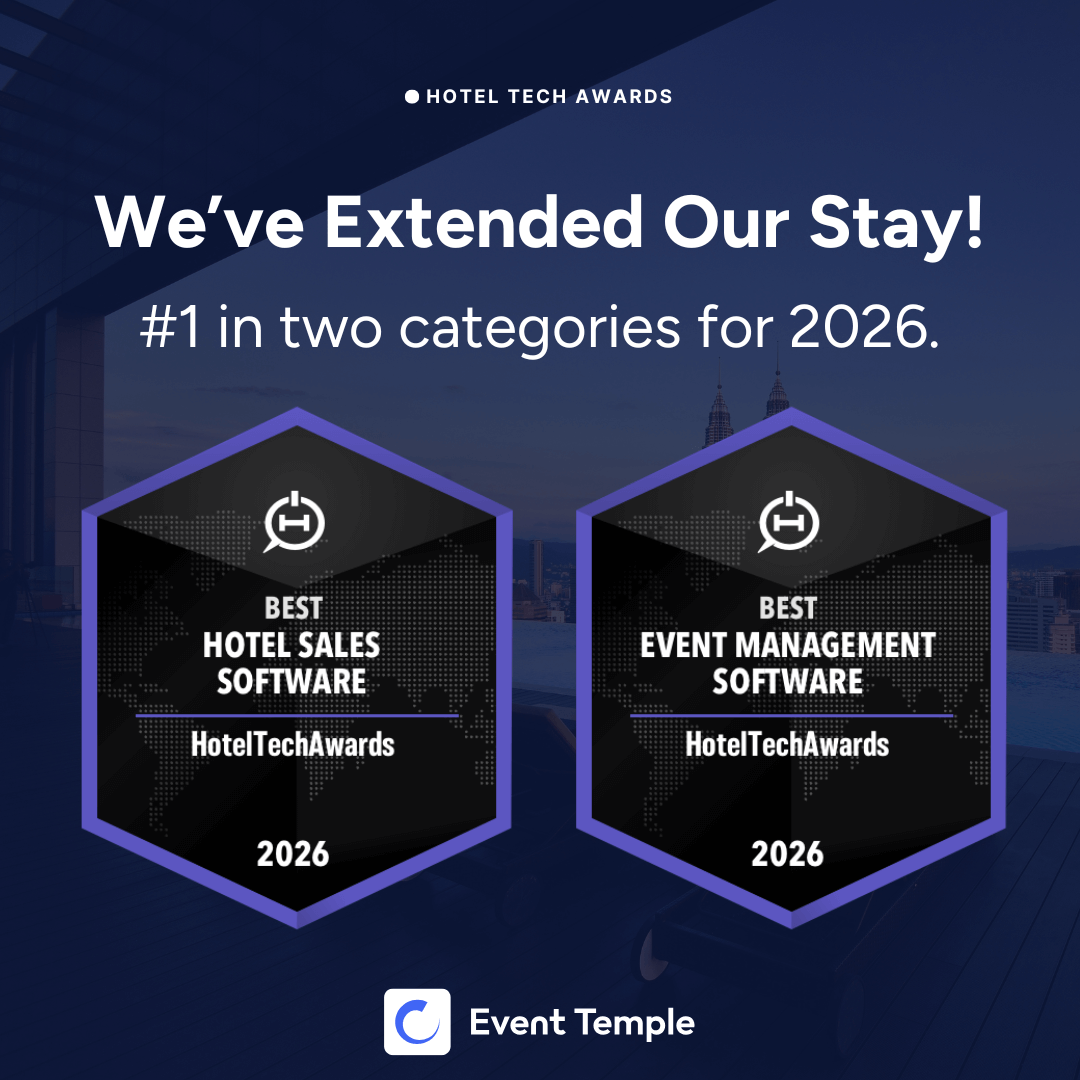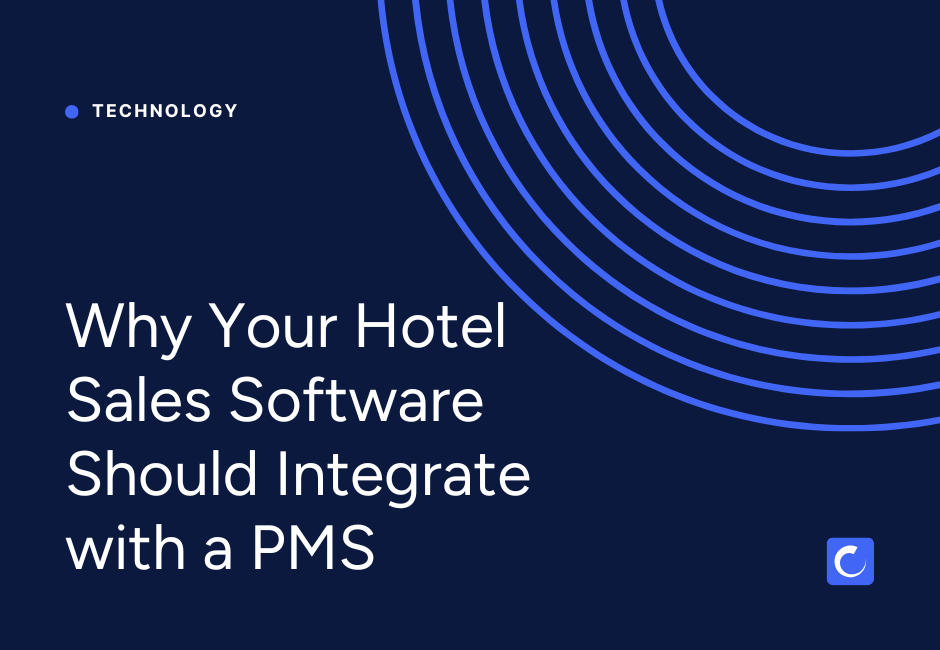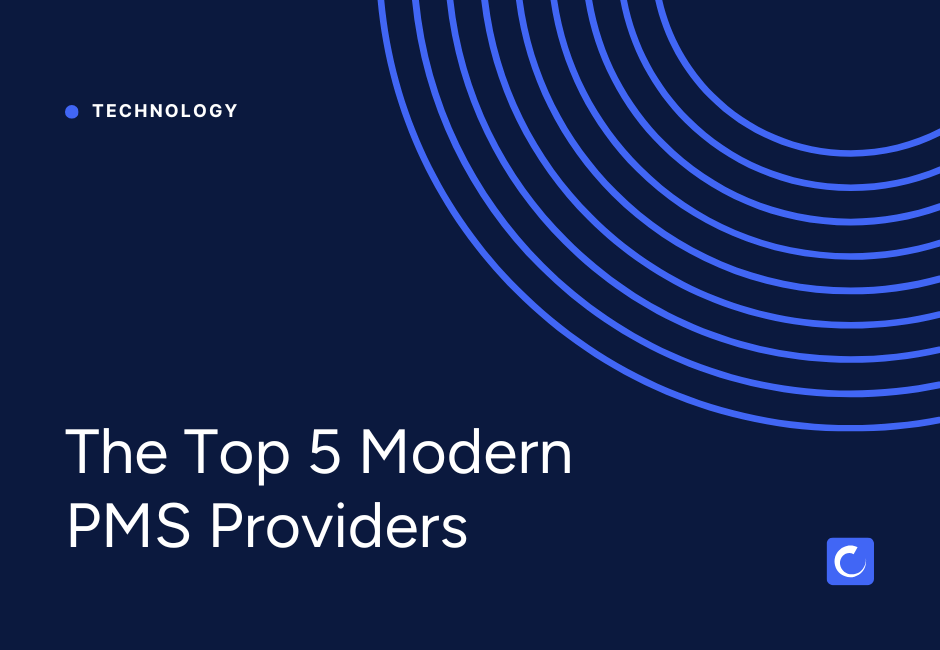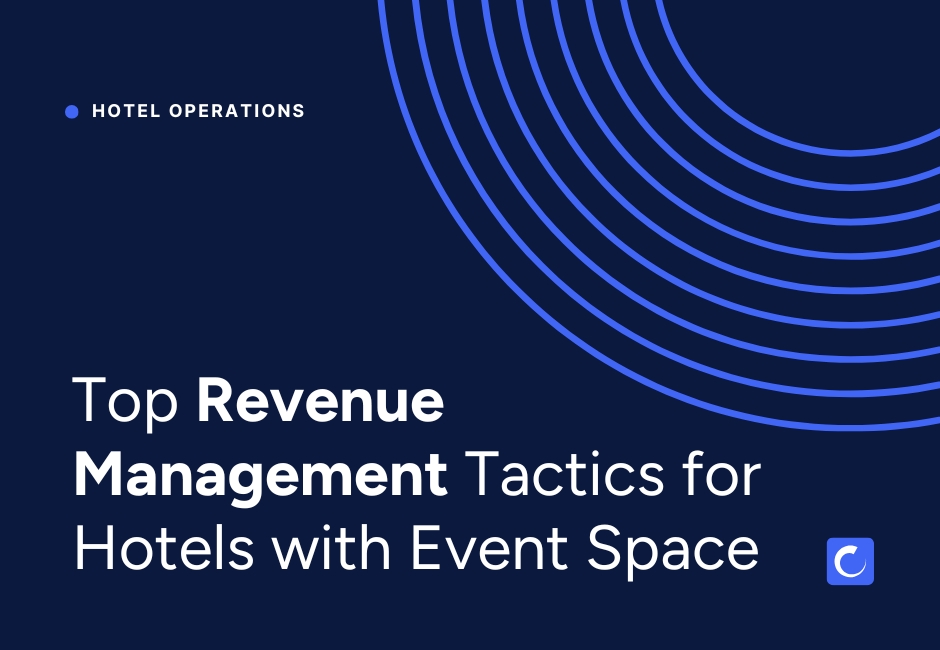
If you've ever tried to manually calculate whether accepting a wedding for next June will generate more revenue than holding out for a corporate conference, you know the headache of event space revenue management.
Should you lock in the sure-thing or wait for something better? What if that wedding brings 150 room nights but the corporate group typically books your higher-margin suites?
These revenue decisions happen all of the time at hotels with event spaces. And let's be honest — many are still making business decisions based on gut feelings and wishful thinking.
Traditional revenue management was about guest rooms: one room, one night, one rate. But event spaces? They’re a whole different beast and bring a lot more complexity into the equation. You're juggling space rentals, F&B minimums, AV packages, setup fees, and the neverending tug of war in terms of how group room blocks will actually pick up. The math gets complicated fast.
In this post we'll break down how to cut through the noise and identify strategic tactics for your team to implement to improve your revenue management strategy.
Understanding the Complexity of Event Space Revenue Management
Unlike guest room inventory, event spaces present unique revenue management challenges:
- Variable configurations: A ballroom that hosts 500 for a reception might accommodate only 200 for a seated dinner
- Multiple revenue streams: Space rental, F&B minimums, AV services, and ancillary offerings
- Longer booking windows: Corporate events often book as far as 6-12 months in advance
- Group room block considerations: Event bookings directly impact accommodation revenue
These complexities make manual revenue management extremely difficult. Hotels need a strategic approach backed by intelligent technology to maximize total revenue per available space (RevPAS).
Building An Event Space Revenue Management Strategy
1. Implement Dynamic Pricing Based on Demand Patterns
Just as room rates fluctuate based on demand, your event space pricing should reflect market conditions. Start by analyzing historical booking patterns to identify:
- Peak demand periods (wedding season, conference months)
- Day-of-week preferences
- Lead time trends
- Seasonal fluctuations
Use these insights to create dynamic pricing tiers based on availability and demand. Depending on your property, for instance, a Saturday evening in June would likely command premium pricing compared to a Tuesday afternoon in January.
Modern software solutions like Duetto OpenSpace can do the heavy lifting for you through automated dynamic pricing and data-driven revenue management.
2. Create Sophisticated Minimum Revenue Thresholds
Setting appropriate F&B minimums and rental fees requires balancing competitiveness with profitability. Consider implementing:
- Sliding scale minimums: Higher minimums for peak dates, lower for need periods
- Package-based pricing: Bundled offerings that increase average event value
- Time-based adjustments: Different minimums for day parts (morning, afternoon, evening)
Hotel sales software like Event Temple has handy fields for implementing F&B minimums directly into your booking and events workflows and documents.
3. Optimize the Rooms-to-Space Relationship
The most successful hotels recognize that event spaces and guest rooms work in synergy with one another. Develop strategies that:
- Prioritize events with high room-to-space ratios during peak occupancy periods
- Offer competitive space rental rates for events that fill room blocks during need periods
- Track total revenue contribution (rooms + events + F&B) for each booking
If you're not sure where to get started with pricing your event spaces, check out our free eBook How To Price Your Event Spaces.
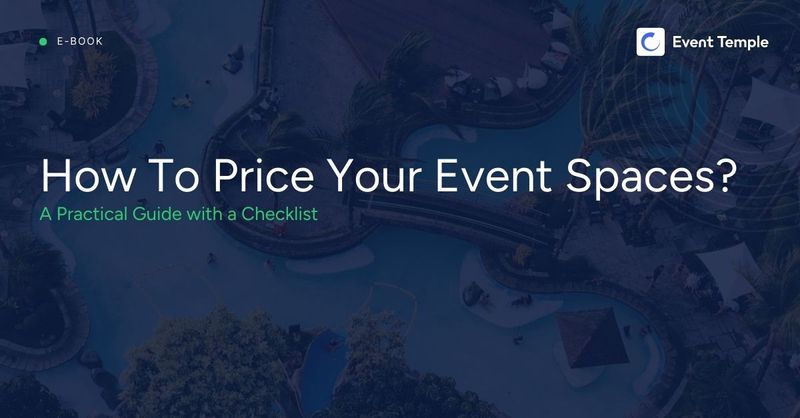
4. Leverage Displacement Analysis
Before accepting and finalizing event bookings, calculate the total revenue impact:
- What is the opportunity cost of blocking this space?
- Could multiple smaller events generate more revenue?
- How does this event's room pickup compare to typical group patterns?
Smart displacement analysis ensures you're always maximizing total hotel revenue, not just event revenue.
If your property allows, and you’re able to get creative around offering alternate spaces or event packages to accommodate more groups and optimize your space utilization and RevPAS, the strategic maneuvering can pay off big time.
5. Implement Intelligent Forecasting
Accurate forecasting drives better decision-making. Track and analyze:
- Booking pace by market segment
- Conversion rates from inquiry to contract
- Historical pickup patterns for group blocks
- Seasonal demand fluctuations
Use these metrics to project future demand and adjust pricing strategies proactively.
Making Technology Work for You
Here's the reality: while spreadsheets and sticky notes might have worked in the past, today's market demands tools that help you make faster, smarter decisions. But what should you actually look for in a solution?
The Non-Negotiables for Event Revenue Management
Real-Time Visibility
You need to see your entire inventory picture at a glance — what's booked, what's tentative, and what's available. More importantly, you need to see how event bookings impact your room inventory and vice versa. If your Saturday night is selling out but you're considering an event with minimal room pickup, you should know that instantly.
Automated Pricing Tools
Manual rate adjustments are slow and leave room for costly errors. Look for systems that can automatically adjust pricing based on:
- Historical booking patterns
- Current demand levels
- Competitive market data
- Your own occupancy forecasts
Integration Capabilities
Your event management system needs to talk to your property management system (PMS), and ideally, both should connect to your revenue management platform.
When Event Temple integrates with solutions like Duetto OpenSpace, you eliminate the administrative nightmare of updating rates in multiple systems and reduce human error significantly.
Building Smarter Workflows & Processes
The best technology in the world can't help if your internal processes are broken. Here's how to structure your operations for revenue success:
Daily Revenue Meetings
Bring your events, revenue, and rooms teams together. Review:
- Upcoming tentative bookings and their revenue impact
- Opportunities to upsell or repackage existing bookings
- Pricing adjustments needed based on pace
- Displacement decisions for the week ahead
Standardized Evaluation Process
Create a clear framework for evaluating every event inquiry:
- Calculate total revenue potential (space + rooms + F&B + ancillary)
- Compare against historical averages for similar dates
- Consider displacement of other potential business
- Make data-driven accept/decline decisions
Regular Strategy Reviews
Monthly, step back and analyze:
- Which types of events generate the highest total revenue?
- Where are you potentially leaving money on the table?
- How accurate were your displacement calculations?
- What patterns are emerging in your market?
Best Practices for Implementation
Ready to put this into practice? Here's your roadmap:
1. Start Where You Are
You don't need perfect systems to begin improving. Start by:
- Tracking your current RevPAS, manually if needed
- Creating basic demand calendars for your market
- Setting up simple pricing tiers (peak/shoulder/valley)
- Measuring conversion rates by event type
2. Get Your Data House in Order
Clean, categorized data is the foundation of good revenue management:
- Standardize how you track event types
- Ensure F&B revenue is properly allocated to events
- Create consistent coding for market segments
- Build historical CRM databases you can actually use and reference
3. Train Your Team to Think "Total Revenue"
The biggest mindset shift? Moving from a "we need to book this space" stance to a "what's the best use of this space?" mindset. Train your team to:
- Calculate total revenue contribution, not just space rentals
- Understand basic displacement concepts
- Use data in sales conversations
- Position pricing as value, not just cost
4. Create Feedback Loops
What gets measured gets managed:
- Review win/loss data monthly
- Track which accounts consistently deliver high RevPAS
- Monitor pickup patterns by event type
- Adjust strategies based on what you learn
5. Embrace Incremental Progress
Rome wasn't built in a day, and neither is a sophisticated revenue management operation. Focus on:
- One new strategy per month or quarter
- Gradual system improvements
- Building team confidence with small wins
- Celebrating progress, not perfection
Common Pitfalls to Avoid
While there’s no one-size-fits-all approach to effective revenue management, these are some common missteps to keep an eye out for.
Racing to the Bottom on Price
When occupancy is low, the temptation is to slash event prices. Resist. Once you train the market that your space is cheap, it's difficult to raise rates again.
Ignoring Ancillary Revenue
That corporate meeting might have a modest space rental, but what about AV, upgraded breaks, welcome receptions, and team-building activities? Always look at the full picture.
Analysis Paralysis
Yes, data is important. But at some point, you need to make decisions and act quickly to secure business. Don't let “perfect” be the enemy of good.
The Path Forward
Event space revenue management is becoming more critical as hotels look for ways to maximize every square foot of their property. The good news is that you don't need to transform overnight.
Start with one area. Maybe it's implementing dynamic pricing for your ballroom. Maybe it's tracking your true RevPAS. Whatever it is, the most important action is to get started and build from there.
The hotel teams cracking the revenue management code are the ones who understand that every decision impacts the bottom line and who use data to make smarter choices every day.
Whether you're using integrated platforms like Event Temple with revenue management solutions, or building your own processes with existing tools, the principles remain the same: know your worth, price dynamically, think total revenue, and never stop learning from your data.

